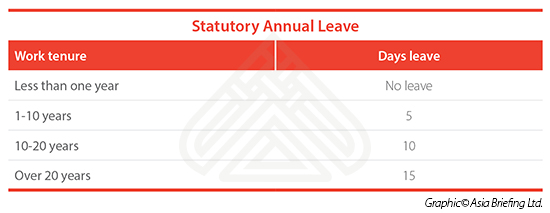How to Manage Statutory Annual Leave in China

By law, employees in China are allowed at least one day off per week. Additionally, statutory annual leave exists for qualified employees.
The amount of statutory annual leave is generally based on an employee’s work experience/tenure.
Employers may extend paid annual leave as a benefit to their employees, but they need to specify the additional days in HR documentation, such as the employee handbook.
Here, we introduce China’s paid annual leave and rest day system, as well as the rules for carrying over untaken annual leave to the next year.
What is the statutory minimum annual leave?
Paid annual leave for employees (including dispatched employees) in China is typically regulated in the “Regulations on Paid Annual Leave of Employees (State Council Order No.514)” and its implementation measures.
Employees who have worked at a company for one continuous year are entitled to five days annual leave. Thus, employers do not have to give leave to employees who have not yet worked for one full year.
It’s important to note that the work tenure is not limited to the length of time an employee has worked for their current employer, but rather refers to their cumulative work experience with all previous and current employers.
Employers can calculate annual leave for newly hired employees as follows:
The amount of annual leave = (The number of days he/she will be working for the current employer in that year ÷ 365) x His/her total annual leave in the same year
In addition, paid annual leave does not include the country’s statutory rest days, public holidays and other additional holidays (e.g. maternity leave and annual visits to family).
Based on Chinese Labor Law, employees are entitled to at least one rest day per calendar week, which can be any day of the week.
Saturdays and Sundays are generally rest days in China. However, employers may arrange rest days according to their operation and production plan.
Employees may not take paid annual leave under the following circumstances:
- Where an employee is legally entitled to a summer and/or winter holiday that is longer than their annual leave;
- Where an employee takes at least 20 days of personal affairs leave and the salary is not deducted according to the regulations of the employer;
- Where an employee whose accumulated working time is more than one year, but less than 10 years, takes sick leave of at least two months;
- Where an employee whose accumulated working time is more than 10 years, but less than 20 years, takes sick leave of at least three months; and
- Where an employee whose accumulated working time is at least 20 years takes sick leave of at least four months.
How to deal with employees’ untaken annual leave
In the case where an employee has not taken all of their paid annual leave in that year, and does not agree to carry over the untaken leave to the next year, the employer must compensate this employee with 200 percent of the employee’s average daily wage for each day of unused annual leave, in addition to their regular daily wage.
Employers can calculate an employee’s daily wage as follows:
Employee’s daily wage = Employee’s average monthly salary ÷ 21.75 days
Note that the average monthly salary does not include overtime payments.
Many foreign companies in China provide additional annual leave for their employees as a benefit. As this part of annual leave is not specified in Chinese labor laws, employers have the right to make internal HR rules regarding compensation schemes.
In practice, employees are generally required to use up their leftover annual leave from the previous year before a specific deadline set by the company’s internal rules. If employees volunteer not to take the leftover annual leaves, they are usually required to sign a written agreement.
Employers are advised to write down these rules in the employment contract or the employee handbook to avoid any possible future labor disputes.
The amount of annual leave= (the number of days he/she will be working for the current employer in that year ÷ 365) × his/her total annual leave in the same year
This article was originally published on February 3, 2016 and has been updated with the latest regulatory changes.
About Us
China Briefing is produced by Dezan Shira & Associates. The firm assists foreign investors throughout Asia and maintains offices in China, Hong Kong, Indonesia, Singapore, Russia, and Vietnam. Please contact info@dezshira.com or visit our website at www.dezshira.com.
- Previous Article Preferential CIT Policies for Small and Low-Profit Enterprises in China
- Next Article IIT Reform in China: What’s in the Draft Law?












